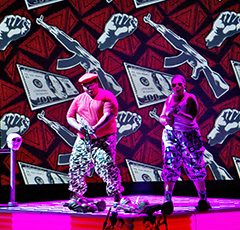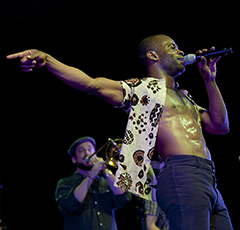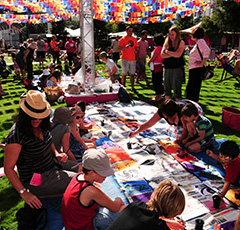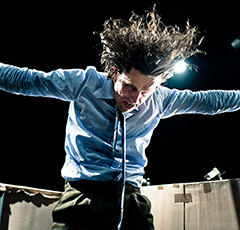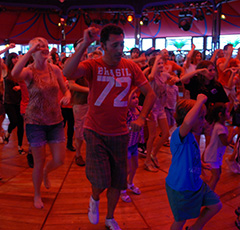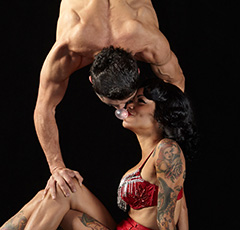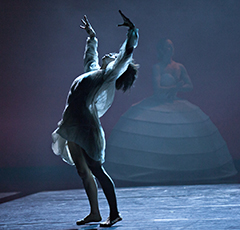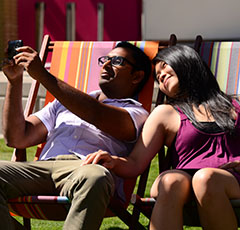AAF programming staff attend Atelier
Auckland Arts Festival programming staff Dolina Wehipeihana and Tama Waipara went to this year's Atelier for Young Festival Managers in Edinburgh. Atelier is a training programme which brought 52 participants from 28 countries to Edinburgh to question everything about festivals.
We asked them a few questions about this fantastic experience.
Photo: c/o photographer Clark James
(Dolina and Tama were funded by Te Waka Toi with support from Auckland Festival Trust).
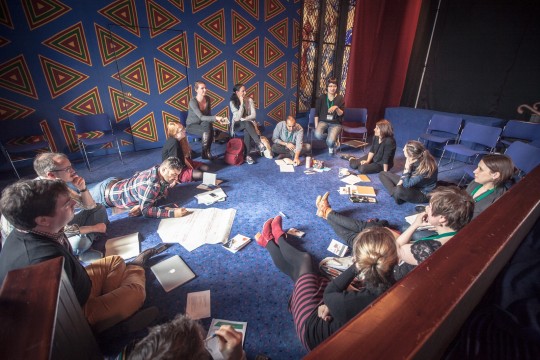
What is Atelier?
Tama: The Atelier is a training programme for young festival managers, run by the European Festivals Association. At this particular Atelier there were 52 participants from 28 countries who came from all sorts of festivals across multiple art forms. The history is drawn from the European festival model and this year’s was significant because it was held in Edinburgh. In 1947 the Edinburgh International Festival started as a response to post WW2 reconciliation and a symbol of hope, and on a practical level because it was one of the cities that was still intact with venues and buildings, so that was the backdrop and the background to the Atelier we went to.
Dolina: Atelier itself is a seven day training programme hosted by 10 mentors from different Festivals around the world. The format included presentations from the mentors with question and answer sessions and we would break up into small groups to discuss topics that participants were interested in. Everybody came to the programme with a paper which had to be presented to the group at large. The papers were based on ideas we had for a festival or something that we were interested in or keen to work on in a festival environment. What was great about the papers was that they often included someone’s passion or interest combined with an area that they’ve already been working in and an innovative idea that combined their passion and their background but was a new concept.
Tama: We discussed how to remove barriers between audience and event and ultimately art form. How to widen the audience and how to also ensure the survival of the art forms and in growing exposure to art forms also grow appreciation.
Dolina: That was the big thing, artists connecting with each other and artists connecting with audiences in this new global yet often online world. The face-to-face interface a Festival provides still remained to be really important.
Tama: Should a Festival grow from an audience demand – from the hopes, ideas and dreams of the everyday person or should they be an avenue to highlight and expose the everyday person to an elevated perspective told through art?
Dolina: It challenged us to think outside of our perimeters and our definitions of ourselves. How you connect to place was a very important theme. A Festival has to have a reason, it has to be connected to the place where it’s held and has to have a reason for being.
Tama: There was also a lot of discussion about the Festival as a vehicle for the development of work and of artists and a platform for them to present internationally.
Dolina: How Festivals can help support the development of emerging artists to create the most amazing work.
Tama: I think what was exciting too was that there were three of us from NZ. It was very clear that despite being from the other side of the world, a lot of the ideas and values that we have resonate with many other people from many different disciplines and backgrounds and seemingly very different environments.
What was the most important learning that you took from the experience?
Dolina: Well I think going into an environment like that - where you’re surrounded by the mentors and other participants, you’re away from home and have time to reflect, the biggest thing I took was the challenge of choosing an artistic programme. When we’re working as Programme Managers it’s more about the delivery of an idea. But I realised that the role of the Artistic Director is to have the biggest possible dream ideas. It’s important to be a visionary and in order to do that you have to be quite free, open up and think more broadly.
Tama: For me the most important thing was the value of thinking outside of your own boundaries and the need to connect beyond the limitations of where you are. To have a clear vision without being too definitive as this is limiting. If you’re too well defined there’s no room to grow.
Dolina: The mentors unashamedly had their own ways of programming Festivals but no one was telling us how we should be doing it. We were completely free to share with each other and to learn from the mentor’s experiences in their Festival journeys. It was really open for the next generation to create their own ways of doing things.
Dolina: Another thing I took away was the relationship that the Programmers and Artistic Directors had with artists. As their careers have developed there have been artists that they’ve worked with over and over again. I found it inspiring to see how an Artistic Director has managed to build connections with specific artists over a 20 year career.
Tama: It’s that strange sort of dichotomy of old and new. Audiences love the familiarity of something they know will be good but they also demand a surprise element with it. It was really interesting to see how people manage that thread of giving people what they want while also taking them somewhere they’ve never been before.
What was the most exciting part of the training programme and how has Atelier inspired you?
Tama: Access to the mentors such as Sir Jonathan Mills who is the Director and Chief Executive of the Edinburgh International Festival and Mark Ball from the London International Festival of Theatre (LIFT). The different ways in which they work are so diverse. The exciting thing was having direct access to be able to ask questions of people who’ve done this for many years. Nele Hertling is in her 80s and told us about living through Nazi occupation, seeing the Berlin wall go up then seeing it come down and running festivals either side of it. She spoke about how a peaceful approach had always yielded more success for her and I found that really inspirational.
Dolina: It has given us a lot of ideas for projects which will probably be long burning ideas that may come to fruition any time in the next 10 – 20 years. My background is as an independent producer, and being at the Atelier gave me space to consider the challenge of touring NZ work internationally, particularly Maori theatre and dance which is my background. How can Producers and Festivals work with and support artists to be able to enter into that territory on a more regular basis? That’s a question that is continuously bubbling for me. Considering ways Festivals engage with local artists, not just to get their work out to NZ audiences, but to ensure that it has a life beyond its initial season.
Tama: We were really lucky to be able to go together, we had very similar threads of thinking but totally different approaches and ways of expressing ourselves, so to have that level of support from someone who understands what you’re talking about and can translate the filter of the experience is of such great value in itself and as a result we were able to quite freely discuss the things that we wanted to come home and do. We were funded by Te Waka Toi with support from Auckland Festival Trust and I think we were always thinking about what the outcome for NZ would be and what New Zealander’s would get out of us going. That put a heavy emphasis on the idea of knowledge sharing, looking at how we could share the experience that we had at Atelier was one of the key discussion points as well as how we can work more collaboratively, not just in our organisation and in our roles but in our community.
Dolina: I think that the role of the festival in New Zealand is not only to bring the most surprising international acts here but to put the best of New Zealand work out there and to continue to develop great work with the community.
Tama: I definitely found that there was a transition throughout the 7 days. We all came in with very specific outcomes in mind, pitching an idea that we believed was THE idea or solution and I think that while we all got to see the value of each other’s perspectives, it was the connection amongst us all which was the greatest connector, we all wanted to solve the problem. Ultimately Festivals are about bringing people together to create joyous moments.
